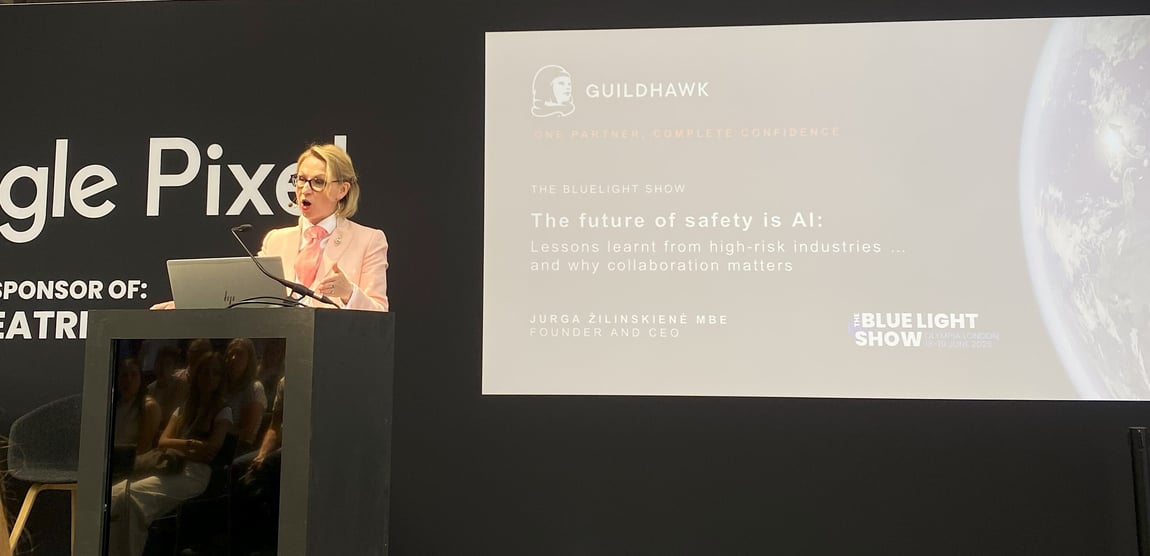
How AI can prevent future grooming scandals: Jurga Zilinskiene MBE calls for AI to protect the vulnerable in keynote at Blue Light Show 2025
On 18 June 2025, at the Blue Light Show, Jurga Zilinskiene MBE, founder of Guildhawk and GAI Translate, delivered a powerful keynote speech calling for the urgent deployment of artificial intelligence (AI) to address systemic data failures that have allowed heinous crimes to go undetected for decades.
Referring to the revelations by Baroness Casey and Home Secretary Yvette Cooper earlier in the week, Zilinskiene emphasised how flawed data, a failure to share information, and denial contributed to the group-based child sexual exploitation scandal in which grooming gangs targeted vulnerable girls while escaping justice.
“Too little sharing of information, too much reliance on flawed data, and too much denial,”
Zilinskiene quoted the Home Secretary, describing how these factors resulted in “too many criminals getting off and too many victims being let down.”
.jpg?width=722&height=542&name=IMG_5116_(1).jpg)
She stressed that AI could play a pivotal role in protecting vulnerable people, detecting such crimes earlier, and preventing similar scandals in the future. However, she warned that for AI to be effective, it must be trained on accurate, verified, and well-organised datasets - and these must include multilingual data, not just English language.
Turning data swamps into verified data lakes
Zilinskiene introduced the concept of “data swamps,” where unstructured, incomplete, and multilingual data hinders agencies’ ability to act. She explained that mapping, cleaning, translating, and labelling data is the critical first step to transforming these swamps into “ultra-pure data lakes,” which can fuel AI systems to deliver actionable insights. “Rubbish in, rubbish out,” she cautioned, emphasising the importance of trust in both the data and the systems built to process and share intelligence.
Citing a recent case highlighted by Victim Support, Zilinskiene described how a vulnerable woman with limited English proficiency was mistakenly arrested after her alleged abuser manipulated the situation and confused police officers. She pointed out that language barriers and flawed data are ongoing issues that could lead to another scandal, just like the grooming cases.
“When data is incomplete, or when language prevents a full picture from emerging, denial often follows,” she said, warning that such crimes could continue to go unreported and unresolved.
AI in action: learning from other high-risk industries
Zilinskiene demonstrated how the same Guildhawk AI technologies already helping industries like mining can be applied to tackle the issues raised by Baroness Casey. For example, mining safety experts at Hawcroft and Sandvik use GAI Translate to securely organise and automate the translation of safety reports, ensuring risks are identified faster and lives are protected.
“If AI can save lives in high-stakes industries like mining, it can certainly help us protect vulnerable individuals from exploitation and abuse,” she asserted.
She also shared examples from HMRC, which uses AI-powered predictive analytics to identify potential fraud cases.
“AI can process data faster and more accurately than humans, but it’s critical to ensure that the data it processes is verified and reliable,” Zilinskiene said.
She emphasised that a “human-in-the-loop” approach is vital, where humans validate and oversee AI-driven decision-making. All decisions taken by HMRC officials that are derived from insights powered by AI, are taken by humans. GAI Translate have a unique one-click feature to enable AI translated results to be reviewed by a certified expert linguist.
Innovating for the future
Zilinskiene highlighted Innovate UK’s support for Guildhawk and Sheffield Hallam University in developing a cutting-edge method for automating data labelling, making it more accurate than manual processes. She stressed the importance of multilingual datasets to reflect the diversity of the UK’s population, ensuring that no vital intelligence is missed due to data not being accurately translated, mapped and analysed.
During the Q&A session, an audience member asked whether AI could help identify perpetrators of the grooming scandal.
Zilinskiene responded, “Yes, AI could help investigators detect them and probably do it better because humans make mistakes. But just like HMRC, the data AI uses must be accurate and verified by humans, and humans must make the decisions.”
She called for immediate action, stating, “Baroness Casey’s findings are a wake-up call. We cannot afford further delays in adopting AI technologies to protect the most vulnerable in our society.”
A call to action
In her closing remarks, Zilinskiene urged leaders in emergency services to break down silos and build trust through collaboration and development of verified multilingual datasets that suitable for training AI models.
She likened AI’s potential to the revolutionary impact of fingerprinting and DNA forensics, saying, “AI will not stop all revolting crimes, but it has the power to prevent many by connecting the dots that humans might miss. The time to act is now.”
Stay tuned for more insights from Jurga Zilinskiene’s keynote as we delve deeper into how AI can transform emergency services and create a safer society for all.
Click here or the image below to download Zilinskiene's complete speech.

